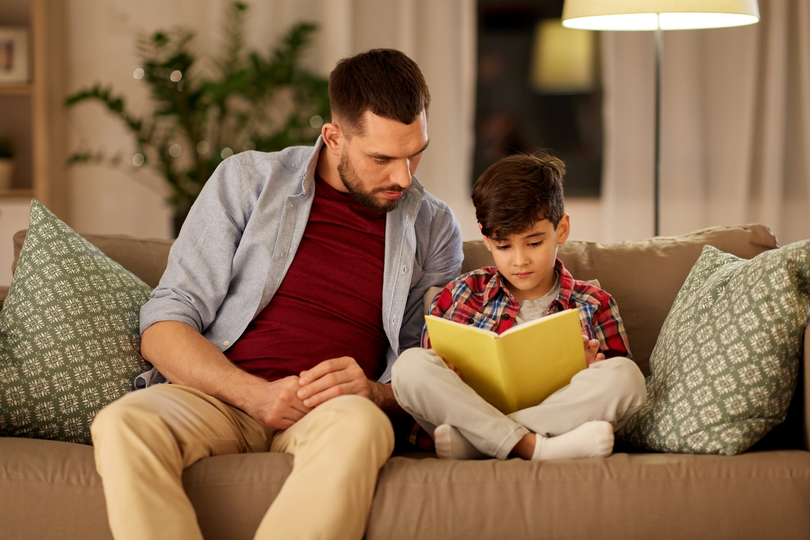"Children are more relaxed than you think!"
Experts explain why it is not the separation that makes the trauma
Contact restrictions and home office. Maybe it's another lockdown. All these decisions mean that families often cannot leave their own walls. For some it means "slowing down", for others it means constantly "sitting on top of each other". For children, it is particularly stressful when things get tight at home. What can you do if you want to separate from your partner?

We at the Parents Hotline have therefore spoken to two therapists. They explain how a separation, where the situation for the children improves, can be successful.
When does it make sense to think about separation?
"During the lockdown, many couples were sitting on each other with all their conflicts," confirms Joachim Braun. Things come out of it "that had previously only smouldered. This is also a chance to deal with what you didn't realize before. That you can work on it and that you can also solve something there."
Whether separation is always the best reaction to it? Robert Coordes advises caution: "We try to keep the ball low in our meetings, especially when it comes to decisions. The crisis is like an amplifier, one way or another."
But: quite a few have lost their jobs, had to give up their business, perhaps have to look for a cheaper apartment. Many of them have to take over the organisation of family life as well as learning support for their children. At some point, it no longer works.
"If I don't know backwards or forwards, I would always recommend getting outside help. That's not a pathetic excuse."
When is a separation really the solution?
Lena is in her mid-thirties and has two children, one is still in kindergarten and the older one is already in school. Lena is happy with her career. It's different with her relationship. When her boyfriend once got physical, she was about to be charged. Because of the constant arguments she is now in therapy and talks regularly with her friends.
Here in the ElternHotline magazine she reported how difficult it is to separate from her partner with two children. Also, and above all, because she cannot find an apartment in Berlin that is cheap and big enough. (finds).
"The waves," she says, "are too high inside."
Joachim Braun has a clear position on this: "My feeling was that Lena urgently needs to get out of the relationship. That's where a Corona situation could really lead: I must get out of this situation with the children."
Robert Coordes takes a similar view: "If it's always based on contempt, always gets loud, always ends up in an argument - then you can't really develop a timetable because there's nobody left who can stick to the timetable
"Separation is not failure, but life experience"
When a couple is at this point, both parts may admit to each other that it is better to separate. "There's nothing worse than living permanently in a place where you can't grow and be humiliated."
Coordes worries: "I see a huge conflict between everything must succeed - family happiness forever - like in this Instagram world and on the other side: absolute uncertainty."
Despite great romantic ideals, the relationship often fails due to the demands of everyday life.
For Braun this is not "failure", but "life experience". And he goes even further: "You have to go through this process of failure. In order to overcome this thinking of saving and failing and winning. That you get rid of that, that vocabulary."
Our experts: Joachim Braun is a certified pedagogue, couple and sex therapist as well as child and youth psychotherapist in his Practice in Berlin-Charlottenburg. He was a long-time employee of "pro familia Berlin". Robert A. Coordes is a certified psychologist, systemic therapist and family therapist as well as head of the institute and founder of the Institute for Relationship Dynamics in Berlin
Our experts:
Joachim Braun is a certified pedagogue, couple and sex therapist as well as child and youth psychotherapist in his Practice in Berlin-Charlottenburg. He was a long-time employee of "pro familia Berlin".
Robert A. Coordes is a graduate psychologist, systemic therapist and family therapist as well as the director and founder of the Institute for Relationship Dynamics in Berlin.
Children feel the energy of the relationship
For children, separation means pressure. It scares them when, as Robert Coordes says, "the gods are at odds". Children are exposed to the energy of the relationship. They don't know what the rules are. They don't even learn about it until they grow up.
"A child should not work on an emotional level to which he or she does not belong. It creates guilt and that's destructive."
Joachim Braun is consistent in this: "It is important to make the separation open and transparent - and to release the children from this guilt and allow them further contact with both parents
"One is my relationship and the other is the children. I have to do my best to make sure they're in contact with both parts."
Psychologist Coordes comes to the same conclusion: "Ideally, both partners should be able to agree to separate. ...because children are more relaxed than you think."
Are you looking for support in partnership conflicts or are you thinking of separating yourself? Here you can get more information.
You can read here that the Corona Crisis also affects children. Education expert Klaus Hurrelmann therefore says: "Children want to be taken seriously!"
Published on
Topics
Articles on the topic
-
Chances and child welfare- go for it!
Article from the Süddeutsche Zeitung

-
What is child sickness benefit and how can I apply for it?
All important information on children's sickness benefit

-
Job loss, job search and fear of the future
What you can do to get back on track

-
Corona - and then what?
How you can support your teenager with fear of the future

-
Parents between all chairs
Unclear specifications require responsible design

-
Not a romantic relationship, still family!
Experts explain how separated parents get along
